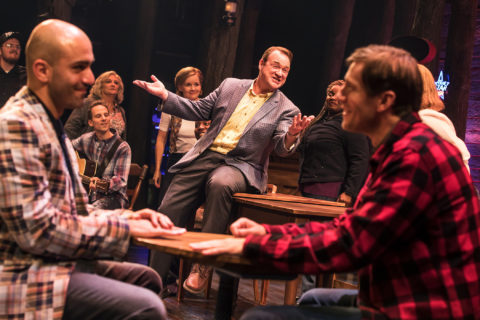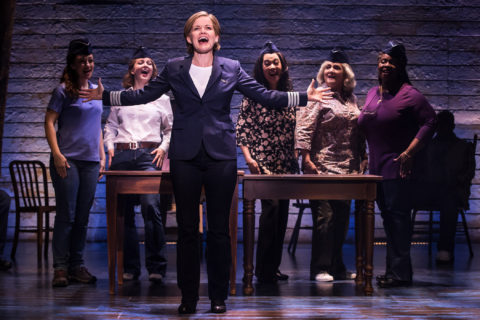
A gabfest in Gander (Photo: Matthew Murphy)
Uplifting. Optimistic. Inspiring. You’ve likely heard these characterizations of “Come From Away,” the hit Broadway musical now making its San Francisco debut at the Golden Gate Theatre. But the show deserves accolades of a different stripe as well: Audacious. Shrewd. Daring.
It took tremendous nerve for writer-composers Irene Sankoff and David Hein to imagine that a positive, humor-filled musical could be raised from the ashes of 9/11. And for commercial producers to invest in the project. It also takes exquisitely calibrated direction — which earned Christopher Ashley a Tony — and performances to keep this material from turning mawkish or disrespectful, too reverent, too light or too dark.
Like the diversion of 38 planes and thousands of passengers to Gander, Newfoundland, in the wake of the terrorist attacks on the U.S., “Come From Away” overcomes enormous risks. The raw material for Sankoff and Hein’s book and lyrics was a series of interviews they conducted with residents of Gander and travelers who were stranded there on 9/11. Their subjects’ voices remain vivid and varied, countering the blatant artifice of musical theater with the much-needed ballast of authenticity.
The characters, many of whom share the names of their real-life counterparts, are sketched quickly but distinctively with tics, neuroses and unique perspectives. Among the travelers are a bickering gay couple, a Muslim chef who draws suspicious stares, the agitated mother of a first responder in New York. Their contrapuntal chatter adds topography to the show’s warm blanket of a surface and keeps “Come From Away” a safe distance from “We Are the World” homogeneity.
While cast members playing multiple roles is commonplace in musicals, “Come From Away” ingeniously turns this practical consideration into an artistic statement. Rather than relying on offstage costume changes, actors transform back and forth between “plane people” and Newfoundlanders. It’s a literal visualization of the show’s overarching message: As different as people may be, they share a common humanity; ultimately, we’re all made of the same stuff.
Even for audience members who miss this subtext, it’s thrilling to see the code-switching prowess of the show’s crackerjack ensemble. Every one of them turns on a dime with million-dollar expertise. Postures shift, facial expressions snap, and accents suddenly switch from British, Arabic and idiomatic American (Southern, Noo Yawk, Midwestern) to goofy Newfie. It’s a bit ironic that while Sankoff and Hein are Canadian, their Newfoundlanders are rendered more generically than their non-Canuck characters.

Becky Gulsvig sings “Me and the Sky” (Photo: Matthew Murphy)
Particularly impressive is Becky Gulsvig, whose “Me and the Sky” is the show’s most compelling solo number. As Beverley, the first-ever female pilot for American Airlines, who captained one of the Gander landings, Gulsvig is a riveting presence, commanding the audience’s undivided attention. Yet between appearances as Beverley, Gulsvig slips stealthily into the Canadian crowd, never pulling our focus from whoever else has stepped to the foreground.
Julie Johnson also stands out in her role as Beulah, the most distinctly drawn Gander local, a good-humored, no-nonsense town matriarch.
Ashley’s direction and Kelly Devine’s musical staging keep their dozen-member cast in constant, crowded motion. Doubling as stagehands, the actors pass props and furniture back and forth. A terrific eight-piece band, on stage for much of the show, enlivens the action with busy, Celtic-influenced accompaniment, full of whistle, fiddles, mandolin and flute. This choreographed commotion evokes the ad hoc activity demanded when 7,000 unexpected guests arrive in a town with a similar population.
Performed in one intermissionless act, “Come From Away” is able to convey the compelling flurry of an emergency through its staging despite the lack of any strong dramatic arc in the script. (They land. They leave. True story.) But it’s the lack of over-amped drama that keeps the show feeling sincere and unexploitative.
The travelers who landed in Gander on 9/11 experienced simple human kindnesses as part of an unexpected detour. “Come From Away” suggests that they belong on our everyday itinerary. You could write that off as treacle. Or take it as a dare
Originally published in the Bay Area Reporter
